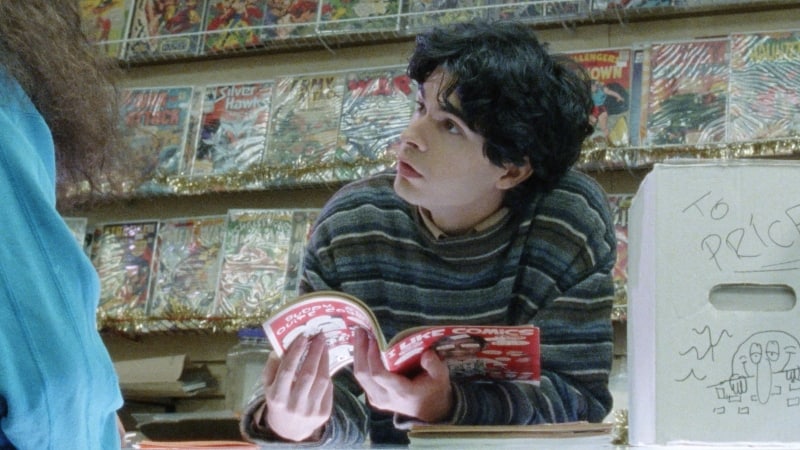‘Funny Pages’ Offers a Hilariously Refreshing Take on the Young Aspiring Artist
Writer-director Owen Kline reveals the chaotic passions of an aspiring cartoonist.

Writer-director Owen Kline’s debut feature, Funny Pages, is a lot like the comics to which the film’s title refers. It is hilarious and silly in all the best ways, but sincerity sneaks its way into a few key scenes. There is the obligatory, over-the-top humor, the kind that sometimes feels like too much but is to be expected in a film about two young boys trying to break their way into the comic industry. The narrative is wanting at times, but just like the funny pages of your local paper, everyone will find something to enjoy in this 90-minute tale about a passionate, entitled young artist trying to make something happen.
The film stars Daniel Zolghadri as Robert, a cartoonist who drops out of high school to pursue his alt-comic dreams. He has no idea how to do this, but he figures his raw talent is enough to justify leaving his cushy family home in Princeton, New Jersey, for a shared boiler room apartment in the state’s capitol, Trenton. After all, how else is he to obtain the edge he feels he needs? Once there, he takes a job as an assistant to a public defender, Cheryl (Marcia DeBonis). Through the new gig, he meets Wallace (Matthew Maher), a man with a short fuse who allegedly assaulted a Rite Aid pharmacist and once worked in the comic book industry.
Robert does not leave everything from his Princeton life behind. He keeps his job at the local comic bookstore, where he banters with the shop’s regulars, shows off his own skills, and soaks in that which came before him. There is also his best friend Miles (Miles Emanuel), who is more subdued but just as passionate about comics. When Robert sees Miles’ own drawings, he becomes territorial and mean. One of the most refreshing things about Funny Pages is how the film avoids getting lost in the genius (imagined or otherwise) of its protagonist. Robert has talent. A traumatic event at the film’s outset explains some of his behavior, but he can be a real jerk too. The film leans into this messiness, leading to moments that elicit cringe, empathy, and a laugh all at once.
The comic shop brings some of Funny Pages‘ best moments. Kline shows both sides of the nerd: the mean snob and the insightful connoisseur, revealing the beauty of the comic strip through the eyes of those who revere it above all else. Robert considers himself and his work to be radical, just like his heroes. His main problem is that he is not a radical and does not really understand what it means to be one. Zolghadri finds the perfect balance between a contemptible rich kid and a genuine dream-chaser. Many will relate to the specific brand of suburban angst Robert experiences. His frustration and capriciousness are all born out of a real love for what he does and a pair of parents who try to support him in all the wrong ways.
Blinded by passion, Robert starts “rebelling” against everyone and everything, leading to a series of hectic, violent incidents. Viewers will not be surprised to learn that the Safdie Brothers are two of the film’s producers. There is a speed and precision to Funny Pages that fits the brothers’ own style of filmmaking, although Kline pairs such moments with softer scenes. In one of the film’s best, Robert bonds with his eccentric, much older roommates, Barry (Michael Townsend Wright) and Steven (Cleveland Thomas Jr.), over their shared love of comics and popular culture. In their genuine joy, one sees the justification for Robert’s obsession. It is when Kline reveals the tenderness baked into the chaos that Funny Pages is at its best.
Comics are the only lens through which Robert is able to see people, and it’s not until Robert learns of Wallace’s past profession that he begins to treat him with any interest. Sensing Robert’s entitlement and desperation, Wallace agrees to mentor him for a fee and a favor. Zolghadri and Maher play off one another to great effect, and Maher, in particular, gives a great performance leaving some viewers wishing for more time with him on screen. Robert, the rich kid, is desperate for any praise and insight, while Wallace, a working-class, explosive man facing criminal charges, cares not about Robert’s feelings or ego. He gives honest feedback, informed by his anger at the world and his own perceived mistreatment. Wallace is actually edgy, sometimes in the wrong ways, but not by some choice or aspiration like Robert.
The final parts of Funny Pages concern the class dynamics that underpin the creation of so much art. Rich people like Zolghadri can decide to live a rugged life, role-playing poverty until they “make it.” Wallace, by contrast, has no such luxury. Kline, himself the son of two famous actors, clearly has much to say about privilege, art, and the blind desires of the aspiring artist. But by the time he begins unpacking the sad and true humor of this reality, the film is at its end. The final act is both the film’s most interesting one and the one that leaves the viewer most wanting. Here’s hoping he continues to unpack these themes in whatever comes next.
Funny Pages debuts in theaters and on-demand from August 26, 2022